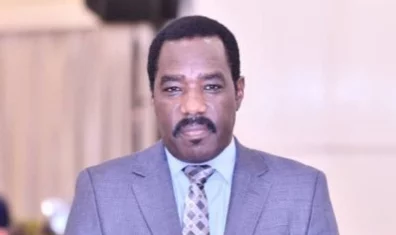Human Resources Minister Blows the Whistle: 90% of the Sudanese are in Dire Need of Aid

Cairo – Sudanhorizon – Sabah Musa
The Minister of Human Resources and Social Welfare, Moatasem Ahmed Saleh, affirmed that the need for the assistance provided by his ministry has increased both during and after the war.
In an exclusive statement to Sudanhorizon news site, Saleh said that the majority of the Sudanese people are now either poor or destitute, noting that no more than 10% of the population is not benefiting from the ministry’s support. He added that 90% of the Sudanese people are in dire need of aid, either directly or indirectly. The ministry, alongside the Zakat Chamber, also receives support from the Ministry of Finance and the Commission for Poverty Reduction and Social Security, which provide aid to poor and vulnerable families. Additional support comes from agencies concerned with Sudanese families, women, and youth.
He explained that there are numerous social protection programs and others focused on empowering these groups and providing them with job opportunities. He added that the ministry now encompasses both human resources and social welfare, meaning the burden has increased, as has the range of groups the ministry serves—particularly graduates and employment-related concerns, among other complex issues. He stated that the ministry is currently working on a comprehensive plan to face these challenges and to explore ways of increasing support, whether from the state or from international sources.
The minister noted that several international organizations already support some of the ministry’s programs, and emphasized the need to collaborate with these organizations and with friendly and sisterly countries to secure funding that would cover the ministry’s needs and further support citizens.
Minister Saleh stressed that the ministry is committed to caring for vulnerable groups and poor families, and stated that most returnees to Sudan are in urgent need of logistical support so that these families can live with dignity. “We have several agencies and units concerned with these groups, such as the Poverty Reduction and Social Security Commission and the Zakat Chamber,” he said, “and we will exert every possible effort to support those in need, despite limited resources. We will especially focus on supporting families recently returned from abroad—whether from Egypt, neighboring countries, or the Gulf.”
He continued: “We will also work on supporting Takaya—charitable centers that provide high-quality food services to the most vulnerable citizens. These are community kitchens that prepare and serve food to the poor.” He stressed that supporting these Takaya facilitates the ministry’s ability to help a greater number of people through direct assistance and by providing essential supplies. He noted the high number of Takaya in Khartoum State, especially in areas such as Omdurman and Bahri, as well as in other parts of Sudan.
Regarding accusations that armed movements insist on taking control of ministries with financial resources, the minister dismissed these claims as malicious and baseless. “We did not request any additional ministries, nor did we ask anyone to change our assigned ministries, which were granted under the Juba Peace Agreement. These ministries are entitlements from the agreement, not privileges or favors,” he said.
He added: “Regardless of the current circumstances, the issue has been resolved and matters have returned to normal. Things should remain as they are until the end of the transitional period unless circumstances necessitate otherwise. So far, we believe there are no conditions or developments that call for any change or for ministries to be transferred from the parties of the peace process to others.”
He concluded: “If there are any shortcomings, they can be corrected—whether through new policies or changes in personnel. But we do not believe there is any justification for changing entire ministries. That phase has passed. We are now part of the ‘Government of Hope,’ working together for the benefit of the Sudanese people to help them emerge from the dark tunnel into a brighter future. We will work as one team, with collaboration, consultation, and sound decision-making.”
Shortlink: https://sudanhorizon.com/?p=6648

